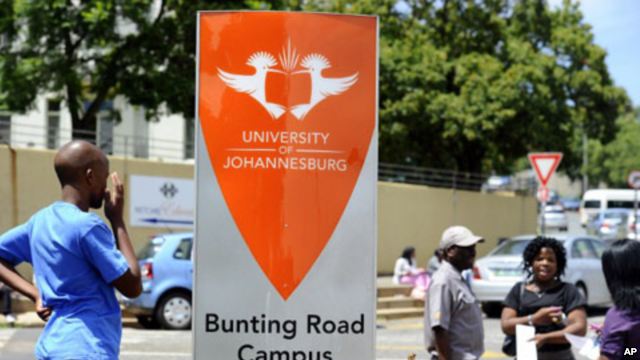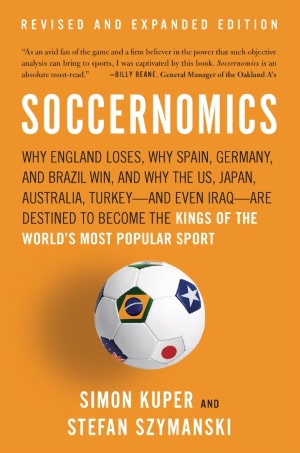
Soccernomics has been called “the Barcelona of football books” and the “Moneyball of soccer.” On Tuesday, April 16, the Football Scholars Forum discussed this influential book with the authors Stefan Szymanski (in East Lansing, Michigan) and Simon Kuper (via Skype). One of the most important questions asked was: How does the introduction of big data and “soccer analytics” change our understanding of fútbol clubs, fans, and nations? The forum also featured intriguing comparisons between Western Europe and the United States.
Joining the authors were: Andrew Guest, Brian Bunk, Christoph Wagner, Corry Cropper, David Kilpatrick, James Dorsey, Mark Siegel, Hikabwa Chipande, Christian Orlic, Benjamin Dettmar, Peter Demopoulos, Steven Apostolov, Tom McCabe, Alex Galarza, and me.
For Twitter timeline click here.
Listen to the audio from the session here (mp3).
Author: Peter Alegi
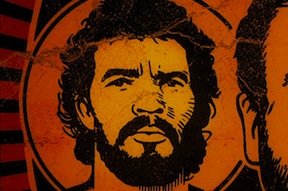
[WATCH: http://vimeo.com/76755353]
Doctor Socrates was futebol’s version of Che Guevara. The fifth and final episode of the superb “Football Rebels” film showcases the lanky, visionary midfielder’s role in the Corinthians Democracy movement that helped push for democratic change in Brazil under military rule in the early 1980s. “One person, one vote,” became the rallying cry of a campaign to elect a sociologist as chairman of Sao Paulo’s popular club. Contesting the election was a conservative businessman who came to embody the forces propping up the military dictatorship. Wearing a headband adorned with the words “Freedom and Justice” Socrates merged football with politics.
As his teammate Wladimir eloquently shows in the film, “Corinthians Democracy” transcended Socrates. The slogan was emblazoned on team jerseys and came to symbolize Brazilians’ dream of universal suffrage. On the final day of the 1983 season, Socrates and his teammates walked on to the pitch carrying a huge banner that read: “Win or lose, but always democracy.” Boosted by this remarkable movement started by courageous, idealistic athletes and embraced by thousands of ordinary men, women, and children, opponents of the dictatorship won provincial elections across the country and strengthened calls for direct presidential elections in Brazil. Watch. Listen. Learn.
Read my post on Socrates’s death here.
Before Pinochet’s rise to power in the September 11, 1973, coup, football clubs sustained a vigorously democratic culture, writes historian Brenda Elsey in her brilliant book Citizen and Sportsmen: Fútbol and Politics in 20th-Century Chile. Colo-Colo and Chile national team forward Carlos Caszely embodies this story. He is at the heart of episode 4 of the “Football Rebels” series on Al Jazeera (iOS users watch it here).
Brought up in a left-wing family in Santiago with its fair share of Communists, Caszely was not your typical professional footballer. He was active in the Players’ Union while many professionals saw themselves as “apolitical,” chiefly concerned with maintaining the status quo. Caszely was well known for his vocal support of Salvador Allende’s Popular Unity government: “Since I had use of my own reason,” he said, “I have liked the Left and I am not thinking of changing my ideals,” (Elsey, p. 217).
Interestingly, two months to the day after the coup, Caszely participated in what may well be the strangest match in football history. He took the field for Chile at the National Stadium in a World Cup qualifier against the Soviet Union. But the opponents were not there. Defying FIFA, the Soviets had refused to play in a stadium where more than 12,000 people had recently been imprisoned, tortured, raped, and brutalized by Pinochet’s goons. Caszely played that day because he was scared for his family’s safety. Sadly, this fear was borne out by the regime’s assault on his mother, whose direct testimony provides a dramatic highpoint in the film. As the footballer says: “I said no to dictatorship on every level: no to dictatorship, no to torture . . . So they made me pay for that with what they did to my mother.”
Caszely would go on to score 29 goals in 49 matches for Chile, taking part in both the 1974 and 1982 World Cup finals. He spent five years in Spain (1973-78) before returning to Colo-Colo. In the twilight of his career, Caszely also played for the New York Cosmos (1984) and for Ecuador’s most decorated club, Barcelona SC of Guayaquil. “Ever since I was a little boy and I started walking, holding my father’s hand, in the district where people play against a wall, against a tree, against a mound, against a big stone, against your opponent, with a football, a plastic ball, a rag ball, a paper ball, even a tin can, if there’s nothing else . . .” he always found a way to play. Despite the regime’s repression and intimidation, Caszely’s conscience and his passion for the game could not be silenced. El pueblo unido jamas serà vencido!
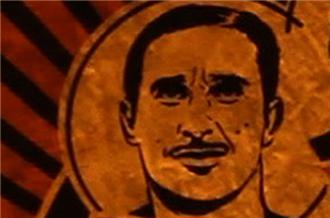 On April 13, 1958, in the midst of Algeria’s war of independence, ten Algerian professional players surreptitiously left France for Tunis. Among them was 21-year-old St. Etienne forward Rachid Mekhloufi, the central character in the second installment of the “Football Rebels” documentary on Al Jazeera.
On April 13, 1958, in the midst of Algeria’s war of independence, ten Algerian professional players surreptitiously left France for Tunis. Among them was 21-year-old St. Etienne forward Rachid Mekhloufi, the central character in the second installment of the “Football Rebels” documentary on Al Jazeera.
Through evocative interviews, archival footage, and on-camera visits to important historical sites, the documentary crafts a lively, humanistic, and emotional account of the FLN team. In tours of North Africa, the Middle East, Eastern Europe, and East Asia between 1958 and 1961, the Algerians compiled a record of sixty-five wins, thirteen draws, and thirteen losses. Playing entertaining, attacking football, the FLN side heightened international awareness of the Algerian fight against French colonialism and garnered broad support for the FLN, at home and abroad. The Algerians even sought to become part of FIFA, but the world body rejected the application.
In a highpoint of the film, Mekhloufi remembers how wearing a national uniform, flying a national flag, and singing “Kassaman” (We Pledge)–which later became independent Algeria’s national anthem–in a stadium full of ordinary fans as well as guerrillas instilled pride in him and made an imagined “Algeria” real. “What I got out of that FLN team,” says Mekhloufi in the closing moments of the film, “couldn’t have been bought with all the gold in the world.” Indeed, by putting patriotism before profit and crystallizing an emerging national identity, the FLN footballers propelled the Algerian people’s quest for equality and freedom. What an incredibly powerful story about sport and human rights. Watch, listen, and learn.
For more details about this revolutionary football team, see my post “Death of a Striker, Fighter, and Socialist” on Ben Bella and my book African Soccerscapes. Other helpful sources are Ian Hawkey’s Feet of the Chameleon, Laurent Dubois’s Soccer Empire, and, for French readers, R. Saadallah and D. Benfars’s La Glorieuse Équipe du FLN and Michel Nait-Challal’s Dribbleurs de l’indépendance.
Next month the University of Johannesburg is hosting an exciting “Research Forum on South African Football.” Organized by the UJ Department of Sport and Movement Studies, the gathering will consider three papers that address socio-historical, sociological, and developmental aspects of football in South Africa, as well as broader issues related to the local game.
In his paper “Professional Football in Apartheid South Africa: Leisure, Consumption and Identity in the National Football League, 1959-1977,” sociologist Chris Bolsmann (Aston University) will present a preliminary analysis of the NFL, a “whites-only” league established in 1959 by a group of (white) Johannesburg businessmen. Playing in segregated stadiums, the NFL introduced professional football to South Africa. At the height of its popularity, it had two divisions, attracted significant corporate sponsorship, and recruited prominent foreign players, such as George Best and Bobby Charlton. The NFL became the leisure and sporting entertainment of choice for significant numbers of black and white South Africans and was unparalleled in popularity during this period.
Ethnographer Marc Fletcher (Department of Sociology, University of Johannesburg) will explore contemporary dynamics in a paper titled “Divisions, Difference and Encounters in Johannesburg Soccer Fandom.” This ethnography of Kaizer Chiefs, Bidvest Wits, and Manchester United supporters’ clubs in the city shows how supporters on the margins of these groups began to engage with the other, crossed racial and class divisions, and thus reinterpreted their understanding of soccer fandom and their wider experiences of everyday life in the city.
Last but not least, Chris Fortuin (Department of Sport and Movement Studies, University of Johannesburg) will discuss “Youth Football Development in South Africa.” The paper notes how in South Africa there is a severe lack of focus on youth football development to sustain national junior and senior teams. I also highlights that youth football development is not coordinated, there is limited success in nurturing young players for the international market, and coach development with a specific focus on youth football is strongly lacking.
This forum takes place on April 19, 2013, 10:00-12:00 at the University of Johannesburg’s Protea Auditorium, School of Hospitality and Tourism, Bunting Road Campus, Auckland Park. For more details please contact Dr. Chris Bolsmann (chris [dot] bolsmann [AT] aston [dot] ac [dot] uk or @ChrisBolsmann on Twitter).
Drogba: The Peacemaker
Omdurman, Sudan, October 8, 2005: moments after Ivory Coast secured qualification to the World Cup finals for the first time, Didier Drogba extemporaneously transformed himself into a peacemaker. His country at the time was torn apart by a civil war between the Muslim-dominated rebel-held north and the mainly Christian south controlled by President Laurent Gbagbo’s government. Surrounded by joyous teammates in the dressing room, Drogba took the microphone and knelt in front of the television cameras. “We have proved that all Ivorians can live together,” he said, “and we can unite with the same objectives. Please, put down your weapons!”
The dressing room scene provides the emotional spark and narrative hook in “Didier Drogba and the Ivorian Civil War,” the riveting first episode of “Football Rebels,” a five-part documentary that began this week on Al Jazeera English. (Watch it here.) “It was just something I did instinctively,” the Ivorian striker would later tell Alex Hayes of The Telegraph in a 2007 interview. “All the players hated what was happening to our country, and reaching the World Cup was the perfect emotional wave on which to ride.”
The Al Jazeera documentary film reveals the little-known story of how Drogba played a key role in getting the national team, The Elephants, to play a 2008 African Nations Cup qualifier against Madagascar in Bouaké in the rebel heartland. Ivory Coast won 3-0, triggering a much needed sense of patriotic pride, national unity, and peace. (Highlights below.)
Presented by former Manchester United star Eric Cantona, “Football Rebels” focuses on players “whose social conscience led them to use their fame and influence to challenge unjust regimes, join opposition movements and lead the fight for democracy and human rights in their countries.” The next episode features another brilliant African player: Rachid Mekhloufi, who left the 1958 French World Cup team to join the FLN team aiding the cause of Algerian independence.
Rethinking American Soccer History
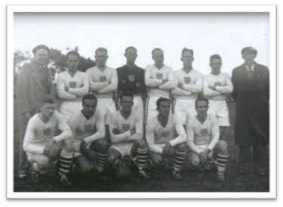 The Football Scholars Forum, an online fútbol think tank, met on February 26, 2013, for a lively session on the history of American soccer. Steven Apostolov shared a paper on Massachusetts; Gabe Logan on Chicago; and Tom McCabe on northern New Jersey. David Kilpatrick, official historian of the New York Cosmos, moderated the 90-minute conversation.
The Football Scholars Forum, an online fútbol think tank, met on February 26, 2013, for a lively session on the history of American soccer. Steven Apostolov shared a paper on Massachusetts; Gabe Logan on Chicago; and Tom McCabe on northern New Jersey. David Kilpatrick, official historian of the New York Cosmos, moderated the 90-minute conversation.
Listen to the audio from the session here.
Twitter timeline here.
